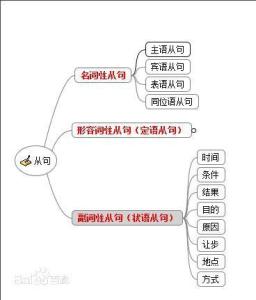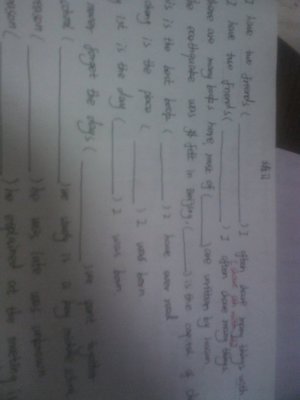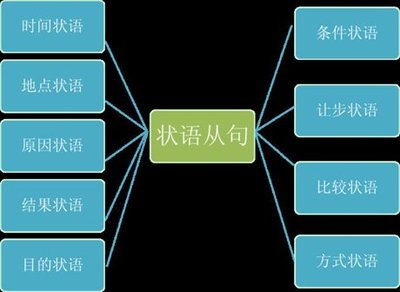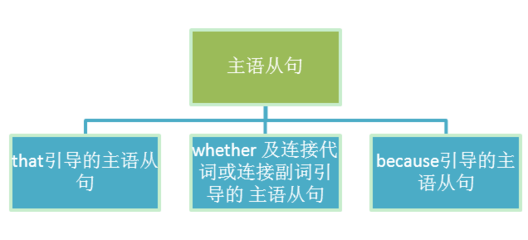
形容词从句是在句中起形容词作用的主谓结构,通常修饰它前面的名词或代词,即它的先行词。形容词从句也称为定语从句(attributive clauses) 或关系从句(relative clauses)。
非限制性从句_形容词从句 -定义
先请看两个句子:--Is that the woman who wants to buy your car? (是那个女的要买你的车吗?)
--I’ve just met Mrs. Smith-Perkins, who wants to buy your car.
(我刚才碰见史密斯-珀金斯夫人,她要买你的车。)
在第一句里,形容词从句 who wants to buy your car指明了是哪个女人,对先行词woman起限制作 用,这就是限制性形容词从句。这样的形容词从句不能随便省略,因为省略之后句意多半不完整。 比如说,如果有人问: “Is that thewoman?”听者很可能会感到莫名其妙, 不知道指的是哪个女人。但 在第二句里,即使省略斜体部分,听者也很可知道说的是哪一位史密斯-珀金斯夫人,也就是说形 容词从句who wants to buy your car只是对先行词作进一步说明作为补充而已,对先行词不起限制 作用,这就是非限制性形容词从句。
非限制性从句_形容词从句 -限制性和非限制性形容词从句在意义上的不同
同一个先行词选择用限制性形容词从句还是非限制性从句修饰,在意义上有时没有什么区别,有时却会有很明显的区别,例如:--The travelers who knew about the floods took another road.
(知道涨大水的旅客走了另一条路。)指部分旅客,从句对旅客作了限制。
--The travelers, who knew about the floods, took another road.
(旅客都知道涨大水了,他们走了另一条路。)指全部旅客,从句对旅客只是作补充说明,没有限制。
非限制性从句_形容词从句 -限制性和非限制性形容词从句在形式上的不同
限制性和非限制性形容词从句在形式上有非常明显的区别:限制性形容词从句一般不以任何方式与句子的其他部分隔开,讲话的时候也没有停顿,书写时不用逗号。而非限制性形容词从句则经常与句子的其他部分隔开,讲话时有停顿(或是改变语调),书写时也要用逗号。请再比较下面的句子:
--Where’s the money (that) Ilentyou? (限制性形容词从句) (我借给你的钱到哪去了?)
--He lent me a thousand pounds, which was exactly the amount I needed to solve my problem. (非限制性形容词从句) (他借给我一千英镑,这笔钱正好可以解决我的问题。)如果非限制性从句位于主句之中,则把从句和主句用逗号分开,如:
--The treatment, which is being tried by researchers at four hospitals, has helped patients who have failed to respond to other remedies.
非限制性从句_形容词从句 -限制性和非限制性形容词从句在文体上的区别
因为非限制性形容词从句往往显得冗长,正式, 所以常用在书面语中, 口语中很少用。
非限制性从句_形容词从句 -限制性和非限制性形容词从句在语法上的区别
这两类形容词从句的区别已不仅仅是用不用逗号隔开的问题,两者之间还有着重要的语法区别。
a. 两种从句中关系代词的用法不同
1)非限制性形容词从句不能用that作关系代词。详见19.2.4 that, which的互换和不可互换。
2)非限制性从句用which作关系代词时有时可以代替前面的整个句子,参见19.6。
3)非限制性形容词从句中的关系代词都不能省略,而在限制性从句中,关系代词that, which,
whom有时可以省略。详见19.3中that, which, whom的省略。
b. 由先行词来决定形容词从句的性质
1)一个先行词(名词)如果已由其他修饰语作了完整的表述,就不再用限制性形容词从句修饰,
但可以用非限制性形容词从句来做补充说明。例如我们不能说:
--*My house which I bought last year has got a lovely garden.
因为名词house已经有了一个代词修饰语my,它就不能再用一个限制性形容词从句来修饰。这个句子应该改为
--My house, which I bought last year, has got a lovely garden.
或者保留限制性形容词从句但去掉代词修饰语,即:
--The house which I bought last year has got a lovely garden.
2)某些先行词只能跟限制性形容词从句
非限制性从句的先行词通常不能是代词,而限制性的形容词从句的先行词可以是(或者含有)any, all, every, some, many, much, no(body), several, those等非特指的限定词,甚至还可以是人称代词 he, she, we(这种用法仅限于正式英语和旧式英语中)。例如:
--In theory anyone who lives or works in the area may be at risk.
--All the students who had failed the test, wanted to try again.
--Every book that is written to deceive the reader should be banned.
--Someone who knows the area, but whose home is outside it, is more likely to be a successful representative.
--Much that has been said tonight will soon be forgotten.
--Nobody who/that watched the match will ever forget it.
--The journey was adisappointmentto those who would have preferred to travel by road.
--He who helps thehandicappeddeserves our support.
… we who are supposed to be so good at talking and writing.
注意,代词you, they, it一般都不能作先行词。不能说*They who work hard deserve some reward. 而一般改为Those who work…
也不能说*It that stands over there is a church. 可以改为 What stands over there is a church. 偶
尔,you后接非限制性形容词从句,如:
--You, to whom I owe allMy Happiness, …
3) 某些先行词只能跟非限制性形容词从句
当先行词是表示通常的“独一无二”的含义时,一般只能用非限制性形容词从句来修饰。例如:
--Dr Brown, who lives next door, comes from Australia.
而当专有名词临时呈现普通名词的特点,不是独一无二时,可接各类限制性修饰语。如:
--Do you mean the Memphis which used to be the capital of Egypt, or the Memphis in Tennessee?
c. 某些句型中只可能出现限制性形容词从句
1)在强调句型:“it + be + 名词/ 代词 + that/ who从句” 中的从句只可能是限制性的形容词从句。
--It was she who initiated divorce proceedings.
--It was Ann that I saw.
--It’s I who am responsible for the organization.
--It is they who are complaining.
2)在there be句型中出现的形容词从句也只能是限制性的。注意该句型中的关系代词常省略。如:
--There are three reasons why we should support this action.
--In fact there are some strategies which are much more reliable.
--Is there anything you want to tell me?
用此句型强调一个否定成分特别常见:
--There’s nothing (that/which) I can do about it.
--There was no way (in which) they could persuade her to try again.
非限制性从句_形容词从句 -形容词从句中的关系词
形容词从句的关系词同时兼有两个功能,一是它们像其他副词或代词一样,要在从句中作状语或是作从句动词的主语或宾语或其它成分,另外它们又像其他连接词一样,把主句和从句连接起来。
请看例句:
--What’s the name of the blonde girl who just came in?
句中who just came in是形容词从句,who是关系代词,它代替the blonde girl成为动词came的主语,同时它又把主句和从句连接成一个句子。所以理解形容词从句中的关系词就是要明白:一它代替主句中的哪个部分,二它在从句中充当什么成分。 这样下面的错误就能避免了:
--*This is the house that my father lived for thirty years. 应该改为 This is the house where/ in
which my father lived for thirty years. 因为关系词代替的是主句中的the house,但在从句中充当的是状语,所以不能用that,改为where 或in which。
形容词从句的关系词一般分为这样两类:关系代词和关系副词。
关系代词
包括代人的who, whom,whose, 代物的which以及既可以代人也可以代物的that
用法
a. 关系代词在限制性形容词从句中:
--I don’t like people who/that lose their tempers easily. (who/that代替主句中的people,在从句中作主语。)
--The airline has a booklet that/which tells you most of the important things about a trip to Europe. (that/which代替主句中的a booklet, 在从句中充当主语。)
--The girls whom/ that he employs are always complaining about their pay. (whom/that代替主句中的the girls,在从句中充当动词employ的宾语。)
--The bed that/which I slept on has no mattress. (which 代替主句中的the bed, 在从句中作介词on 的宾语。)
--Let ABC be a triangle whose sides are ofunequallength. (whose代替主句中的 triangle,在从句中作定语修饰sides)
b. 关系代词在非限制性形容词从句中:
--This is Mr. Gallagher, who writes comic poetry. (注意此时的who不能用that来替代)
--The giant panda, which is to be found in the remote parts of China, livesexclusivelyon bamboo shoots.
--His house, for which he paid $10,000, is now worth $50,000.
--The small man in the raincoat, whom nobody recognized, turned out to be Olivia’s first husband. (注意whom不能省略, 也不能替换为that)
--Ann, whose children are at school all day, is trying to get a job.
关系副词
包括代替时间的when,代替地点的where以及代替原因且先行词为reason的why。也有的语法学家认为when, where, why这三个副词不过是代替了指时间的in/on which, 指地点的in/at which,以及可以指示原因的for which。
--Dan’s fondest memory is of last year, when the club gave a tea party for the Queen Mother. (when代替主句中的last year,相当于 in which, 在从句中作时间状语。)
--I know a wood where you can find wild strawberries. (where 代替主句中的a wood,相当于in which, 在从句中作地点状语。)
--Is there any reason why you can not come? (why代替主句中的reason,相当于for which,在从句中作原因状语。)
--In time we reached a stage where we had more black readers than white ones. (注意where 的先行词除了地点名词外,还可以是situation, stage 等词)
关于that的特殊用法
a. that替代其他关系代词
在限制性形容词从句中that 是最活跃的一个关系代词。它常常可以代替其他关系代词(除了 whose),既可指人,也可指物;可以作主语,也可以作宾语。口语体中尤其明显。
--He is the man who/that people like at first sight. (指人,作主语)
--The lawyer whom/who/that I consulted gave me some useful advice. (指人,作宾语)
--Could you iron the trousers which/that areHanging Upbehind the door? (指物,作主语)
--The school which/ that my children attend is within walking distance. (指物,作动词宾语)
--The ladder which/ that I was standing on began to slip. (指物,作介词宾语。注意只能说The ladder on which I was…
b. 从句连接词只能选用that
先行词前如果有限定词all, any(thing), every(thing), (a) few, (a) little, no(thing), none, only, some (thing), very或含有序数词或形容词最高级等修饰时,其后的关系代词通常要用that。如果这个关系代词作动词宾语时也可以省略。如:
--All that he has ever said confirms my suspicions of his motives. (= What he has ever said…)
--All the apples that fall areeatenby the pigs.
--Have you got anything that belongs to me? (= Have you got what belongs to me?)
--I advise you to accept any offer you receive.
--I hope that the little that I’ve been able to do has been of some use. (= I hope what I’ve…)
--The only thing that matters is to find our way home. (= What matters…)
--That’s the very film that I want to see.
--I’ll speak to her the first opportunity I have.
--The visiting room was the worst (that) I had seen.
--She must be one of the most remarkable women that ever lived.
c. 作主语补足语的连接词that
限制性形容词从句中,当先行词是一个表示特征的主语补足语时,该从句用that而不是who来引导。
此时的that也可以省略。
--She’s not the brilliant dancer (that) she used to be.
…the distinguished actress that she later became.
--That was the kind of person she was.
(在非限制从句中,则用which来引导, 如:Theyaccusedhim of being atraitor, which he was. )
关于that 和which的互换和不可互换
如果先行词是物,which和that在限制性形容词从句中大都可以互换,但在非限制性形容词从句中不能用that。例如我们可以说:
--TheWHISKYthat/ which hedranklast night cost him eight pounds.
但是,在非限制性形容词从句中,
--I passed him a large glass of whisky, which he drank immediately. 不能说成*…whisky, that he drank…
另外,which在非限制性形容词从句中可以代替前面整个分句或句子(具体用法参见19.6), which也可以用在“介词+which”结构(参见19.5.1)。这两种情形下的which都不能用that替换。
who 和whom的区别
这两个关系代词的先行词都是人,但它们的区别并不与人称代词主格和宾格的区别相对应。其实who, whom主要是文体上的区别:whom大致上限用于正式文体,在非正式文体中,人们有避免使
用whom的倾向,可以用who,that来代替whom,但这些关系代词通常都被省略。
--People (that) I visit/ speak to… 就比People whom I visit/ speak to…更多见于口语中。
以下例句中,如果选用whom则表示文体较正式,如果选用who, that或是干脆省略关系代词,则文体属于非正式。
--The lawyer (whom/ who/ that) I consulted gave me some useful advice.
--That’s the man who (m) I saw talking to your parents.
--I think you should stay faithful to the person (whom/who/that) you’re married to.
但是注意:在介词后的只能是whom而不能是who,如不能说*This is the person to who you spoke. 而是This is the person to whom you spoke. (具体用法参见19.5中“介词+ whom”)。
whose 的用法
whose与其它关系代词一样在从句中都能单独充当一个句子成分,表示所属关系,whose象his, her 或its这样的形容词性物主代词一样与名词连用, whose充当该名词的定语。在形容词从句中(包括限制性与非限制性形容词从句),“whose + 名词”这一结构可以用作主语,动词宾语或介词宾语。另外请注意whose既可指人也可指物。例如:
--The film is about a spy whose wife betrays him.
--In Wasdale there is a mysterious dark lake, whose depth has never been measured.
--It was a meeting whose importance I did not realize at the time.
--According to Cook , whose book is published on Thursday, most disasters are avoidable.
--This is Felicity, whose sister you met last week.
在先行词是非人称的情况下,有某种避免使用whose的趋势。有时用of which代替whose指物,词序一般是“名词+of which”。
--He’s written a book whose name / the name of which I’ve completely forgotten. (另参见19.5.2)
或者改用介词词组,如:
--The house whose roof was damaged has now been repaired. 改为The house with the damaged roof has now been repaired.
why
虽然说用why引导的形容词从句可以用来修饰先行词reason,可是the reason why在语义上显得重复,人们普遍使用的是省略why或是换用名词性从句。如:
--Is that the reason why they came? 通常说成:
--Is that the reason they came? 或Is that why they came?
关系代词that 和which 的省略
在限制性形容词从句中,关系代词that, which作动词宾语或介词宾语时常常被省略,口语体中尤其如此。
--The ladder (that/ which) I was standing on began to slip.
--The car (that/which) I hired broke down after five kilometers.
--This is the room (that/which) Churchill was born.
限制性形容词从句可以修饰一些感叹性名词短语(一般表示不赞同),此时的从句关系代词通常也省略。如:
--The fuss they made!
--The things they get up to!
--The clothes she wears!
在表明方式、时间或地点的某些单词后面,常用that代替in which, when或where。此时that也可以省略。
--I didn’t like the way (that) she spoke to me.
--The day (when/that ) she arrived at the congress was sunny.
--Things have changed a great deal since the last time you were here.
--Throughout the period I was in London, it rained heavily.
--The moment (when) you do something they disagree with they are at your throat…
--Do you know anywhere (that) I can get a drink?
形容词从句的缩简形式
形容词从句通常可以有三种缩简方式:动词-ing形式 ,动词-ed形式以及介词短语。请注意,缩简之后的短语或分句并不一定依然作定语修饰原来的先行词,很多时候它们可以作状语。还有,可以缩简为短语的形容词从句必须是:从句的关系代词作从句的主语。
缩减为V-ing形式 / -ed形式
a. 形容词从句在下列情况可缩简为动词-ing形式
1) 从句中的动词是进行时态,例如:
--People who are/were waiting for the bus often shelter/shelteredin my doorway. 缩简成
--People waiting for the bus…
--He gestured towards the three cards that were lying on the tables. 缩简成:
--He gestured to the three cards lying on the tables.
--The bride, who was smiling happily, chatted to the guests. 缩简成:
--The bride, smiling happily, chatted to the guests. (-ing短语作伴随状语)
--the scream of a man who is/ was dying in torment 缩简成:
--the scream of a man dying in torment
-ing形式可以有被动态,表示被动进行,例如:
--Reports that are being written by mycolleaguewill be discussed tomorrow. 缩简成:
--Reports being written by my colleague …
2) 从句中的动词表示一个习惯性或连续性的动作:
--Passengers who travel/ traveled in this bus buy/ bought their tickets in books. 缩简成;
--Passengers travelling in this bus…
--A notice which warns/ warned people… 缩简成:
--A notice warning people…
--Anyone who/that followed this advice could find himself in trouble. 缩简成:
--Anyone following this advice could find himself in trouble.
3) 从句中的主要动词表示一种愿望,即句中动词是wish, desire, want, hope等(但不是like),例如:
--people who wish / wished to go on the tour 缩简成:
--people wishing to go on the tour
--fans who hope/ hoped for aglimpseof the star 缩简成:
--fans hoping for a glimpse of the star
4) 从句中的动词是某些静态动词
--awickershopping-basket that /which containsgroceries缩简成:
--a wicker shopping-basket containing groceries
--It was a mixture that consists of oil and vinegar. 缩简成:
--It was a mixture consisting of oil and vinegar.
--This is a liquid that resembles that of soapy water. 缩简成:
--This is a liquid with a taste resembling that of soapy water.
5) 非限制性形容词从句中如果是上述动词之一或者是表示知道、考虑的任何动词(例如know, think, believe, expect)
--John, who knew that his wife was expecting a baby, started to take a course on baby care.
缩简成:
--John, knowing that his wife was expecting a baby, …
--Peter, who thought the journey would took two days, said… 缩简成;
--Peter, thinking the journey would take two days, said…
--Tom, who expected to be paid the following week, offered… 缩简成;
--Tom, expecting to be paid the following week, offered…
--Bill, who wanted to make an impression on Ann, took her to… 缩简成:
--Bill, wanting to make an important impression on Ann, took her to…
6) 表示同位的形容词从句
--She enjoys her job, which is teaching English. 缩简成:
--She enjoys her job, teaching English.
--Julia, who was a nun, spent much of her life in prayer an meditation. 缩简成:
--Julia, being a nun, …
--The baby would probably not live to grow up, who was a scrawny little thing, unlikely to survive the normal ailments of childhood. 缩简成:
--…, being a scrawny little thing, …
b. 形容词从句缩简为动词-ing形式后并不一定表示进行形容词从句缩简为动词-ing形式并不总是表示进行.在许多情况下-ing形式只是表示主动。也就是说一个-ing短语可以代替多个动词时态。如:
--The person writing reports is my colleague. = The person who will write/ will be writing/ writes/ is writing/ wrote/ was writing reports is my colleague.
即形容词从句中处于不同时态的动词词组write reports都可以替换为同一个分词短语writing reports。
c. 形容词从句缩简为动词-ing形式后并不一定是定语动词-ing短语替换了原来的形容词从句后并不一定还作定语,它们也可以作状语。如:
--The apple tree, which wasSwayinggently in the breeze, was a reminder of old times. 缩简成:
--The apple tree, swaying gently in the breeze, … (作状语,补充说明the apple tree)
--The crowd, who were laughing and shrieking, rushed under the nearest trees. 缩简成:
--Laughing and shrieking, the crowd rushed under the nearest trees. (作状语,表示伴随)
d. 替换限制性形容词从句的-ing短语通常不能用完成体,如:
--The man who has won the race is my brother. 不能替换为
--*The man having won the race is my brother.
e. 形容词从句缩简为一个带逻辑主语的-ing短语
有时,形容词从句可以替换为一个带逻辑主语的-ing短语,例如:
--He began hitting them with his stick, whose reply had not come as quickly as he wanted 缩简成:
--…, their reply not having come as quickly as he wanted..
--Bats are surprisingly long-lived creatures, some of which have a life-expectancyof around twenty years. 缩简成:
--…, some having a life-expectancy of around twenty years.
f. 形容词从句缩简为否定的-ing短语
否定形式的-ing短语也可以代替形容词从句,例如:
--He, who did not wish to boast, paused. 缩简成:
--He paused, not wishing to boast.
--He, who had not seen her for fifteen years or so, failed to recognize her at first. 缩简成:
--He failed to recognize her at first, not having seen her for fifteen years or so.
g. 形容词从句中的主动词是被动态,即先行词是该动词表示的动作的结果或承受者,则可以用-ed短语替代形容词从句。-ed短语直接置于名词(先行词)之后。
--a girl who is/ was called Patricia 缩简成:a girl called Patricia
--those who are/have been/ were/ had been assembled 缩简成:those assembled
--two of the problems that have been mentioned above 缩简成;two of the problems mentioned above
--The substance, which was discovered almost by accident, has revolutionized medicine. 缩简成:
--…, discovered almost by accident, …
--The novels of Mary Webb, which were praised by Stanley Baldwin and were so popular in the 30s, and so popular in the 30s, were great favorites of mine. 缩简成:
--…, praised by Stanley Baldwin…
--She who was surprised at my reaction tried to console me. 缩简成:
--Surprised at my reaction, she tried to console me.
h. 一个
 爱华网
爱华网



